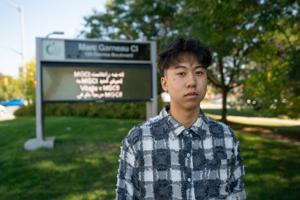Education
Lottery Admissions Spark Debate Over Fairness in TDSB Schools

The Toronto District School Board (TDSB) is facing significant backlash over its 2022 decision to implement a lottery system for admissions to specialized programs in high schools. Critics argue that this change has diminished academic quality and school spirit, while supporters claim it promotes equity among students.
At Marc Garneau Collegiate Institute, a decline in student engagement is evident. Clubs that once thrived with enthusiastic participation have seen attendance drop sharply. Grade 12 student Victor Jiang, part of the school’s TOPS program for math and science, attributes this shift to the lottery system. He argues that the random selection process has “drastically” altered the dynamics of specialized programs, leading to unequal skill levels among students and affecting the overall curriculum. Jiang, who also serves as a TDSB student trustee, believes this change has “profoundly hurt the student community.”
TDSB officials have indicated that an update to the admissions policy is forthcoming, with applications for the next academic year opening in November. However, the board declined to comment on the ongoing concerns surrounding the lottery system.
The lottery was introduced to replace the previous merit-based admissions process, which relied on auditions, exams, and portfolios. The new system aims to create a more equitable environment by prioritizing underrepresented students, including Indigenous applicants and those from diverse racial and socio-economic backgrounds. In math, science, and technology programs, half of the spots are reserved for girls.
Ayan Kailie, whose daughter is currently in Grade 11 at the Etobicoke School of the Arts (ESA), supports the lottery system. She believes it provides opportunities for students from lower-income families who may not have access to resources like private lessons. Kailie’s daughter, who is thriving at ESA, might not have been admitted under the old system due to financial constraints. Kailie asserts that the lottery is about giving every child a fair chance, regardless of their background.
Despite this support, many educators and parents contend that the lottery has not fulfilled its promise of diversity or improved program quality. Patricia Warnock, head of the music-theatre program at ESA, advocates for a return to a merit-based system with equitable access measures. She notes that her school previously made efforts to encourage applicants from underrepresented areas but faced restrictions from the TDSB after the lottery was implemented.
Warnock highlights a troubling trend: dropout rates have increased since the introduction of the lottery. For example, nine Grade 9 students transferred out of ESA last year, a significant rise from only one transfer in the 2019-2020 academic year. She observes a shift in student engagement, with some students in specialized programs lacking the necessary interest or background in the subjects.
At Rosedale Heights School of the Arts, Grade 12 student Hailey Jackson shares similar concerns. She has noticed a decline in school spirit and a drop in participation in events, which she attributes to the lottery’s impact on community dynamics. Jackson believes that a merit-based admissions policy would better serve students who genuinely belong in specialized programs, as it allows for a more tailored fit between students and educational environments.
Michael Danishevsky, co-chair of the parent council at William Lyon Mackenzie Collegiate Institute, echoes these concerns, describing the lottery as a “failed experiment.” His son is enrolled in the school’s enriched MaCS Program, which he claims has experienced lowered academic standards and increased dropout rates since the policy change. Danishevsky recently co-authored a report with economist Marcin Peski from the University of Toronto, analyzing the effects of the lottery on student performance in mathematics. Their findings indicate a decline in TDSB’s overall performance in national math contests following the lottery’s introduction.
As the TDSB prepares for the upcoming admissions cycle, the debate surrounding the lottery system continues. Many stakeholders are calling for a reassessment of the policy, advocating for a system that balances equity with the need for high standards in specialized programs. The outcome of this discussion could shape the future of educational opportunities for students across the Toronto area.
-

 Science3 months ago
Science3 months agoToyoake City Proposes Daily Two-Hour Smartphone Use Limit
-

 Health4 months ago
Health4 months agoB.C. Review Reveals Urgent Need for Rare-Disease Drug Reforms
-

 Top Stories4 months ago
Top Stories4 months agoPedestrian Fatally Injured in Esquimalt Collision on August 14
-

 Technology3 months ago
Technology3 months agoDark Adventure Game “Bye Sweet Carole” Set for October Release
-

 World3 months ago
World3 months agoJimmy Lai’s Defense Challenges Charges Under National Security Law
-

 Lifestyle4 months ago
Lifestyle4 months agoVictoria’s Pop-Up Shop Shines Light on B.C.’s Wolf Cull
-

 Technology3 months ago
Technology3 months agoKonami Revives Iconic Metal Gear Solid Delta Ahead of Release
-

 Technology3 months ago
Technology3 months agoApple Expands Self-Service Repair Program to Canada
-

 Technology3 months ago
Technology3 months agoSnapmaker U1 Color 3D Printer Redefines Speed and Sustainability
-

 Technology3 months ago
Technology3 months agoAION Folding Knife: Redefining EDC Design with Premium Materials
-

 Technology4 months ago
Technology4 months agoSolve Today’s Wordle Challenge: Hints and Answer for August 19
-

 Business4 months ago
Business4 months agoGordon Murray Automotive Unveils S1 LM and Le Mans GTR at Monterey









